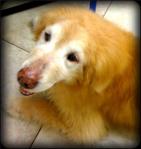Hypothyroidism in 14-Year Old Golden Retriever
“Help! I shaved my dog and now the fur won’t grow back!”
Haley smiled up for a picture from Doc Truli. Her front end wore a clown-face mask of grey and white fur. Her bald nether regions told a different story!
“Doc, I shaved Haley last summer to help with the heat, and to help make sure there were no fleas or ticks. Then that fur in the back there never grew back in!”
Haley had dental calculus build-up, skinny, atrophied hind limb muscles, and no fur on her tail, back of her legs, or part-way up her rump! How embarrassing.
Doc Truli suggested,”Let’s test Haley for hypothyroidism.”
“What’s that?”
Dogs and People Get Autoimmune Thyroiditis
-Hypo means low, or below. So a hypothyroid condition means that the body is not producing enough of the master metabolic hormone, called thyroid hormone.
In dogs, we test for the Total T4, unbound T4 by dialysis (which refers to the process in the lab to separate out the hormone, dialysis), and sometimes the Thyroid Stimulating Hormone (TSH) and the T4, T3, TSH autoantibodies. The University of Tennessee performs most of the test design for the United States, and they are very good at it.
Testing for Hypothyroidism Just Requires a Quick Blood Sample
Painless, quick, and easy for your dog. If your veterinarian determines your dog has a sluggish thyroid, then thyroid hormone supplementation is available and affordable.
Tru Tip
Dogs are insensitive to thyroid hormone supplementation compared to people and they urinate much of the hormone unchanged. Therefore, the doses are astronomical compared to human doses. If you ordered the medicine through a pharmacy for humans, the pharmacist would assuredly question the dose!
Symptoms of Hypothyroidism
Because the thyroid hormone helps set the metabolic rate for the body, when it runs low, or the body does not respond to the hormone properly, metabolism slows down. Therefore, the symptoms relate to a slowed metabolic rate.
Remember, you need to see your veterinarian for a diagnosis because many of these symptoms are general and not specific to the thyroid problem.
- Gain weight easily, for no clear reason
- Recurrent, or difficult to cure infections, like bladder, ear or skin infections
- Sagging belly and thin fur
- Bald “Rat Tail”
- Snoring and a change in the bark voice
- Sluggish, lethargic, tired
- Skin cool to the touch
How Your Dog Feels Better With Thyroid Hormone Supplementation
- More energy
- Warmer body
- Heal faster
- Arthritis feels better
- Digest food better
- Fur can regrow
- Loose weight (which helps breathing, the heart, the joints, etc.)
What is “Euthyroid Sick?”
Euthyroid sick basically means another primary disease suppresses the thyroid; the thyroid itself is not the primary problem. You must let your veterinarian find and treat the primary problem. Often the thyroid will normalize without specific treatment.
Each Dog is Unique, Let Your Veterinarian Diagnose and Monitor Your Dog
Be careful to have your dog diagnosed properly. You cannot rely on the Total T4 Level alone.
Doc Truli says,”If you start hormone supplementation based only on the screening Total T4 number, then your dog may need to continue the hormone for the rest of his or her life, even if hypothyroidism was not a problem in the first place!”
Let your veterinarian check your dog’s T4 level about 1 month after every change in dose, or after a major illness. Doc Truli recommends checking the T4 at least once every 6 months, and checking full laboratory profiles at least yearly. Probably your hypothyroid dog also suffers arthritis, and needs special blood tests to make sure the arthritis program is properly monitored.
Haley’s Laboratory Tests are Pending
Doc Truli and most veterinarians have treated hundreds or more dogs with hypothyroidism. If Haley turns out not to be hypothyroid, we’re going to investigate Cushing’s disease next!
P.S. If you highlighted the picture of Haley’s back, there’s a round, raised bump. That turned out to be a cyst filled with fluid, not a tumor!





Trackbacks and Pingbacks